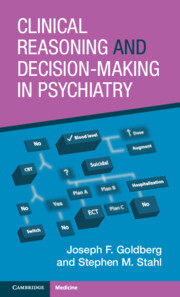Book contents
- Clinical Reasoning and Decision-Making in Psychiatry
- Reviews
- Clinical Reasoning and Decision-Making in Psychiatry
- Copyright page
- Contents
- Foreword
- Preface
- 1 Making Sense of the Senseless: How to Gather and Organize Pertinent Information
- 2 The Approach to Diagnostic Ambiguity
- 3 What the Patient Isn’t Telling You: When Seeing Is Not Believing
- 4 Shared Decision-Making
- 5 Deciding on Appropriate Treatment Modalities: Medication, Psychotherapy, Hospitalization, and Other Levels of Care
- 6 Measurement-Based Care and Applying Statistical Concepts to the Individual Patient
- 7 Hypothesis-Testing and Crafting Patient-Specific Decision Trees
- 8 Decision Points in Iterative Pharmacotherapy
- 9 Hierarchical and Complex Pharmacotherapy Decision-Making
- 10 Prioritizing the Components of Any Decision-Making Model
- Index
- References
5 - Deciding on Appropriate Treatment Modalities: Medication, Psychotherapy, Hospitalization, and Other Levels of Care
Published online by Cambridge University Press: 25 March 2024
- Clinical Reasoning and Decision-Making in Psychiatry
- Reviews
- Clinical Reasoning and Decision-Making in Psychiatry
- Copyright page
- Contents
- Foreword
- Preface
- 1 Making Sense of the Senseless: How to Gather and Organize Pertinent Information
- 2 The Approach to Diagnostic Ambiguity
- 3 What the Patient Isn’t Telling You: When Seeing Is Not Believing
- 4 Shared Decision-Making
- 5 Deciding on Appropriate Treatment Modalities: Medication, Psychotherapy, Hospitalization, and Other Levels of Care
- 6 Measurement-Based Care and Applying Statistical Concepts to the Individual Patient
- 7 Hypothesis-Testing and Crafting Patient-Specific Decision Trees
- 8 Decision Points in Iterative Pharmacotherapy
- 9 Hierarchical and Complex Pharmacotherapy Decision-Making
- 10 Prioritizing the Components of Any Decision-Making Model
- Index
- References
Summary
Deciding when psychiatric medications or other types of treatments are indicated – and defining precise targets and goals of treatment – is perhaps the most fundamental of all undertakings in clinical psychiatry. As with all medical treatments, clinicians and patients should both have a clear and explicit understanding of what they expect medications, psychotherapy, or other interventions, to do. Medicines do not fix bad relationships or resolve existential dilemmas, but they can equip people with more intact capabilities to solve problems through better concentration and executive functioning, or improve someone’s capacity to negotiate stresses with less bias and influence from distorted beliefs or intense emotions. Pharmacotherapy is somewhat analogous to eyeglasses when it comes to driving a car; glasses do not confer driving skills but they can help minimize visual obstructions and improve how the brain processes information in ways that might otherwise prevent someone from making the fullest use of their knowledge about the rules of the road. Psychotherapy constitutes driving lessons.
- Type
- Chapter
- Information
- Clinical Reasoning and Decision-Making in Psychiatry , pp. 112 - 144Publisher: Cambridge University PressPrint publication year: 2024

